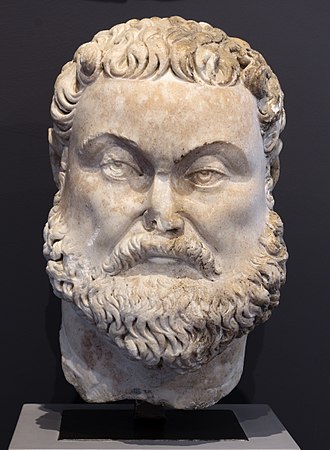Tetrarchy
Tetrarchy refers to a form of government where power is divided among four individuals. It is most famously associated with the system implemented by the Roman Emperor Diocletian in 293 AD, aimed at addressing the vast empire's administrative and defensive challenges. This innovative system marked a significant departure from the traditional singular rule of Roman emperors and had profound implications for the structure and stability of the Roman Empire.
Origins and Implementation
The Tetrarchy was established by Diocletian in response to the increasing difficulties of managing the empire's extensive territories and defending its borders. The empire was divided into two major parts, the Eastern and the Western Roman Empires, each further split into two, creating four divisions. Each division was ruled by a senior emperor, or Augustus, and a junior emperor, or Caesar. The Augusti held the primary authority, while the Caesars acted as their deputies and successors.
Diocletian appointed Maximian as his co-Augustus to rule the West, while he himself took charge of the East. Each Augustus then appointed a Caesar—Galerius in the East and Constantius Chlorus in the West. This division was intended to facilitate more efficient governance and military defense by placing capable leaders in key strategic regions.
Structure and Governance
The Tetrarchy was characterized by a complex system of governance that sought to balance power among the four rulers. The emperors shared authority over the empire's affairs, but each was responsible for administering his own territory. They were expected to work in harmony, but the system also included mechanisms for resolving disputes and ensuring succession.
The empire was divided into dioceses and provinces, with each ruler overseeing several of these. The Tetrarchs undertook significant administrative reforms, including the reorganization of provinces to reduce their size and thus, the power of provincial governors. This reorganization aimed to improve administrative efficiency and curb the threat of rebellion.
Military and Economic Reforms
Under the Tetrarchy, the Roman military was restructured to address the persistent threats along the empire's borders. The army was expanded, and its units were stationed more strategically across the empire. The Tetrarchs also initiated significant economic reforms, including the introduction of new taxes and a revised coinage system to stabilize the economy.
Religious Policies
The Tetrarchy period was marked by significant religious developments, including the persecution of Christianity. Diocletian and his co-rulers sought to reinforce traditional Roman religious practices and viewed Christianity as a threat to imperial unity. This led to a series of edicts against Christians, culminating in the Great Persecution. However, the Tetrarchy's religious policies would eventually be reversed by Constantine the Great, who embraced Christianity.
Dissolution and Legacy
The Tetrarchy system began to unravel after the abdication of Diocletian and Maximian in 305 AD. The balance of power shifted, leading to conflicts among the Tetrarchs and their successors. The system effectively ended with the rise of Constantine the Great, who reunited the empire under his sole rule after a series of civil wars.
The Tetrarchy represents a significant, albeit temporary, departure from the traditional model of singular imperial rule in Roman history. It demonstrated an innovative approach to governance that sought to address the empire's complex challenges. Despite its eventual dissolution, the Tetrarchy laid the groundwork for future administrative divisions of the empire and influenced the governance structure of later periods.
Transform your life with W8MD's budget GLP-1 injections from $125.
W8MD offers a medical weight loss program to lose weight in Philadelphia. Our physician-supervised medical weight loss provides:
- Most insurances accepted or discounted self-pay rates. We will obtain insurance prior authorizations if needed.
- Generic GLP1 weight loss injections from $125 for the starting dose.
- Also offer prescription weight loss medications including Phentermine, Qsymia, Diethylpropion, Contrave etc.
NYC weight loss doctor appointments
Start your NYC weight loss journey today at our NYC medical weight loss and Philadelphia medical weight loss clinics.
- Call 718-946-5500 to lose weight in NYC or for medical weight loss in Philadelphia 215-676-2334.
- Tags:NYC medical weight loss, Philadelphia lose weight Zepbound NYC, Budget GLP1 weight loss injections, Wegovy Philadelphia, Wegovy NYC, Philadelphia medical weight loss, Brookly weight loss and Wegovy NYC
|
WikiMD's Wellness Encyclopedia |
| Let Food Be Thy Medicine Medicine Thy Food - Hippocrates |
Medical Disclaimer: WikiMD is not a substitute for professional medical advice. The information on WikiMD is provided as an information resource only, may be incorrect, outdated or misleading, and is not to be used or relied on for any diagnostic or treatment purposes. Please consult your health care provider before making any healthcare decisions or for guidance about a specific medical condition. WikiMD expressly disclaims responsibility, and shall have no liability, for any damages, loss, injury, or liability whatsoever suffered as a result of your reliance on the information contained in this site. By visiting this site you agree to the foregoing terms and conditions, which may from time to time be changed or supplemented by WikiMD. If you do not agree to the foregoing terms and conditions, you should not enter or use this site. See full disclaimer.
Credits:Most images are courtesy of Wikimedia commons, and templates, categories Wikipedia, licensed under CC BY SA or similar.
Contributors: Prab R. Tumpati, MD






